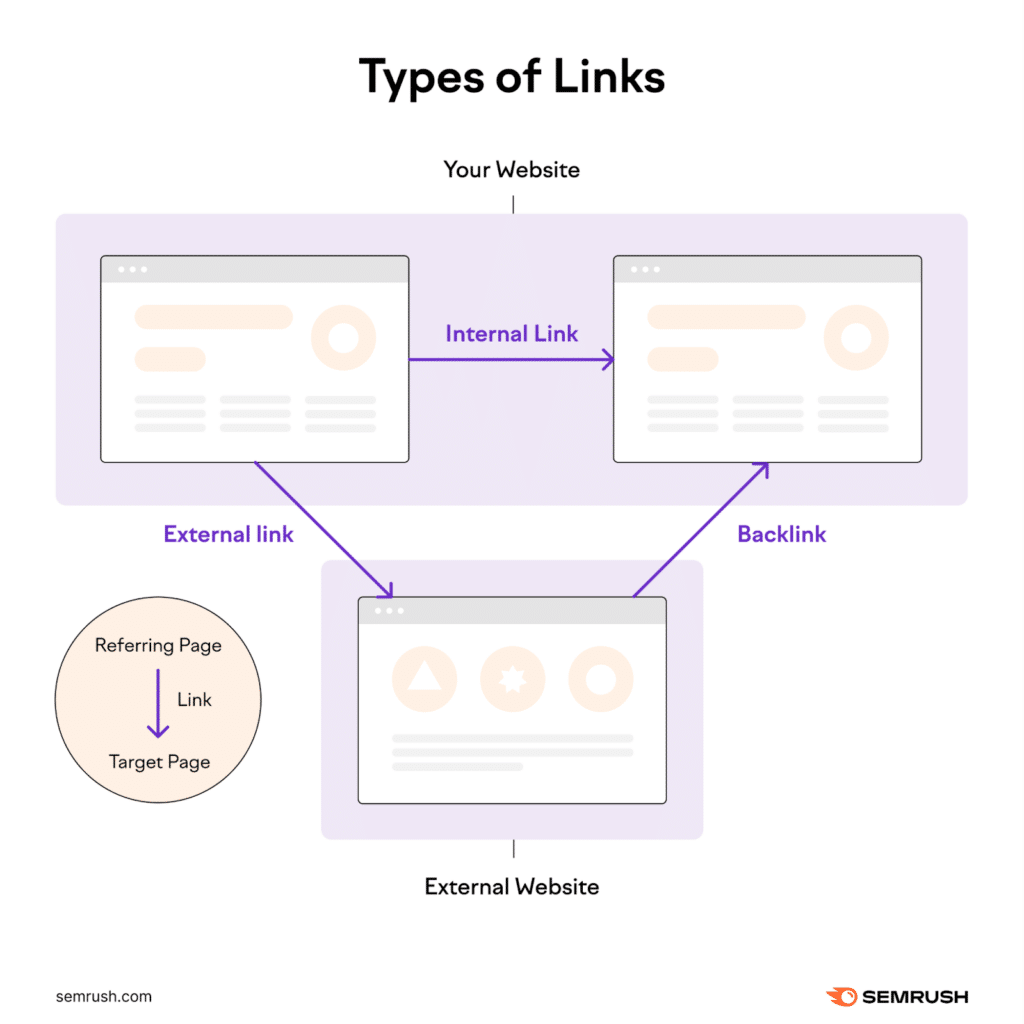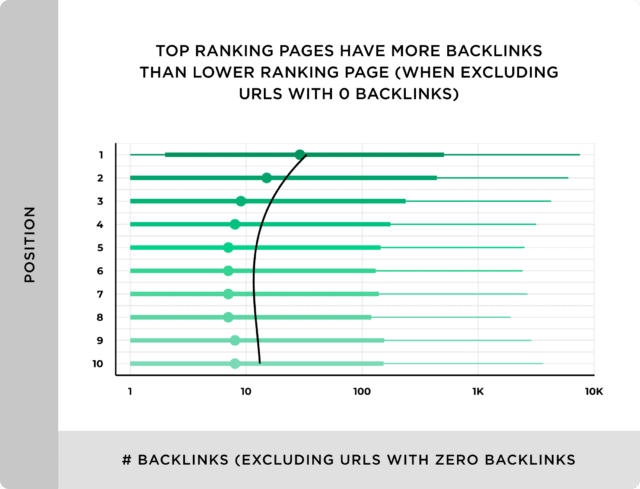If you build it, they will come.
This may be true for magical baseball fields in Iowa. But to boost your website’s search engine ranking, you need to do more than just build a site and wait.
Search engine ranking, or where your website lands on a search engine results page, is inherently linked to website traffic volume. The higher you rank, the more traffic you tend to see.
Many factors play into how well your site is ranked, including quality of content, page authority, and even URL length. One of the most important, and often overlooked, elements of achieving a desirable ranking is generating high-quality backlinks.
A backlink is created when another website links to yours. Search engines view these links as recommendations or votes of confidence for your site. The more authority a linking site has with a search engine, the more valuable that backlink is to your authority.
Below is a simple diagram depicting types of hyperlinks.

Read on to learn how to generate backlinks to your website like an SEO expert.
Why You Should Generate Backlinks
Because the cool kids are doing it. No, really. Envision a quality backlink as that popular friend at school who will introduce you to the people you want to know. Generating backlinks is a way of networking your website to gain audience and authority. And much like when you network in person, the more people who link to you, the stronger your industry presence becomes.
Rank Higher on Search Engine Results Pages
A recent SEO study conducted by Backlinko found that the “#1 result in Google has an average of 3.8x more backlinks than positions #2-#10.”. Additionally, sites with backlinks from many different domains ranked higher than sites with less diversity in their links. The following chart depicts the correlation between backlinks and ranking.

See an Increase in Referral Traffic
A high-quality backlink, from a trusted source with a solid web presence, can provide a steady stream of new traffic for your site. Even “no follow” links, or those that don’t directly count toward search engine ranking, can ultimately benefit your website’s SEO by increasing traffic to your site and adding diversity to your backlink portfolio.
Get Indexed by Web Crawlers Faster
Search engines use website crawlers (also known as spiders) to gather and parse internet content. These search engine bots scan a website’s pages and index its information. Then, when you perform an internet search, an algorithm is applied to this index and the websites with relevant content appear on the search engine results page (SERP).
Given that there are billions of web pages, the spiders start with a list of known sites and look for hyperlinks to add to the crawl list. More popular and authoritative sites tend to get crawled first.
Getting a backlink from a quality source can put you on the fast track to getting noticed on SERPs.
Increase Authority and Brand Awareness
Think back to the school metaphor. If a friend you trust and admire introduces you to a new person, you might immediately feel more positive toward them given the common ground. Similarly, when someone clicks on your link from a site with authority, it can help improve your authority through association.
Website backlinks from popular companies can also help increase your brand awareness. It’s like distributing your product through a major retailer versus selling it at a local market. The more people who see your name, the more potential customers you have.
4 Website Backlink Strategies That Will Boost Your Ranking
An experienced backlink generator knows that link building can yield bountiful results, but they also know it can be a long and arduous process.
Luckily, there are many ways for you to successfully generate quality backlinks and rank higher on search engines. A little bit of hard work and patience will go a long way in helping you develop a robust backlink portfolio for your website. Here are four industry-proven backlinking methods.
1. Generate Foundational Links on Social Media and Business Review Sites
Aptly named, foundational links are some essential building blocks of an SEO strategy. These types of backlinks are a natural step forward after publishing your website and they’re the first chance for your site to gain traffic and get crawled.
The links that you place on your business’s Facebook page or LinkedIn profile to direct people to your site are two common examples of foundational links. Social media links don’t technically count in page ranking, but they’re still a valuable contribution toward your internet presence, especially when first starting your SEO campaign.
Guest posting for websites in your niche is also a good starting point. In these posts, you can include relevant links to your website that help build your backlink portfolio and boost your domain authority. Bonus — you get the benefit of building professional relationships with your peers.
Internal links, though they’re not technically backlinks, can be considered foundational as well. They are hyperlinks on one part of your website that link to another part of your site. These early internal links can help you begin to rank on SERPs for low-competition keywords in your niche that you highlight with anchor text.
2. Pack Your Pages with High-Quality Content People Want to Share
While this should be a no-brainer, you’d be surprised how many website owners leave their pages devoid of good content. A sparse number of blog posts or a lot of poor-quality posts can equally work against your domain authority. Consistently publishing content that’s of high value to your industry, combined with an effective backlinking strategy, is a surefire way to get noticed.
Start by doing industry research into trending topics and keywords and studying the content of popular competitors to get an idea of the type of well-ranking web pages. Note that content format also affects ranking. For example, “why” posts and infographics tend to get more clicks than listicles and general posts.
Once you’ve compiled your research, write similar (but still unique) posts and share them with others in your niche. Continue writing and marketing your high-quality content. After a while, you’ll acquire enough traffic and backlinks to see a boost in your search engine ranking.
3. Replace Broken Links on Other Sites
Broken link building is a way of advertising yourself while helping someone else. This process involves finding broken hyperlinks on websites within your niche, contacting the website owner, and offering a relevant link to your content as a replacement for the broken link. This is also a great way to build relationships in your industry, as people are generally grateful for the free link audit.
To start, you can find in-depth tutorials online for broken link building. There are even internet browser plug-ins you can install that will instantly find and highlight all the broken links on a webpage, allowing you even more time to perfect your link-building tactics.
4. Build Relationships with Industry Peers and Influencers
If you’re following steps 1-3, then you’re already well on your way to building meaningful relationships in your industry. Yet there are always more ways to connect.
Becoming a source for reporters and bloggers is a solid means of brand exposure. One of those random quotes from industry professionals in articles and blog posts could be your random quote!
Websites like Connectively Us (formerly HARO) and Help a B2B Writer allow writers to connect to subject matter experts to source quotes for their content. Just register as a source and look out for writer requests in your industry. Then, send them a finely crafted answer and watch your authority and audience grow.
Providing subject matter expertise on forums like Reddit and question-and-answer sites like Quora is another way to drive traffic to your website. Additionally, leaving thoughtful comments on others’ web pages can help you promote your business without using direct marketing.
Avoid Unethical Link-Building Practices
Generating backlinks is hard work and it can be tempting to seek a shortcut. Fair warning, the road to low link authority is paved with black hat link-building.
Black hat link-building is when website owners employ unethical strategies to manipulate algorithms and rank higher on search engine results pages. Using such tactics, it goes against Google Search (and other engines’) guidelines to generate backlinks.
While it’s not illegal, black hat link-building does you no favors and only decreases your ranking potential. It can even lead to your site being permanently de-indexed.
Search engines notice and penalize you for using these unethical backlink generator tactics:
- Purchasing Spam Links on Link Farms: Websites that only exist to hyperlink to other websites are called link farms. The owners of these sites mass-post different types of content and sell links to other websites in those fields. A common example of this can be found on expired domains.
- Joining and Utilizing Private Blog Networks: While networking with peers in your industry via professional groups can prove beneficial, avoiding shady Private Blogging Networks (PBNs) is essential to ethical link building. Unethical PBNs can be connected to link farms and are just another means for a website owner to profit from selling thousands of poor-quality hyperlinks.
- Leaving Spam Comments on Blog Posts: Unethical link builders use dubious techniques to spam hundreds of comments linking to their site on blog posts. Quite often these comments have almost nothing to do with the blog post subject. This is an especially foolish method because comment links are usually “no follow” and pull no weight in your search engine ranking. So, in the end, you just look like a spammy slob for nothing.
- Hiding Links on Your Posts: Save your magic tricks for the talent show. Hiding links by using the same font color as your background or putting them behind images is a tactic that stuffs keywords where they don’t naturally fit. It’s a bad linking practice and will ultimately hurt your search engine ranking.
Watch Your Website Backlinks Work for You
Hopefully, this quick guide has helped you understand why backlinks are important to your website and how to effectively begin a backlink campaign.
It can take a while, but with focus and perseverance, you will start to see your domain authority grow.
If you need help creating pages that people want to link to, reach out and let our subject-matter experts at Express Writers create specialized, in-depth SEO content for your website.
